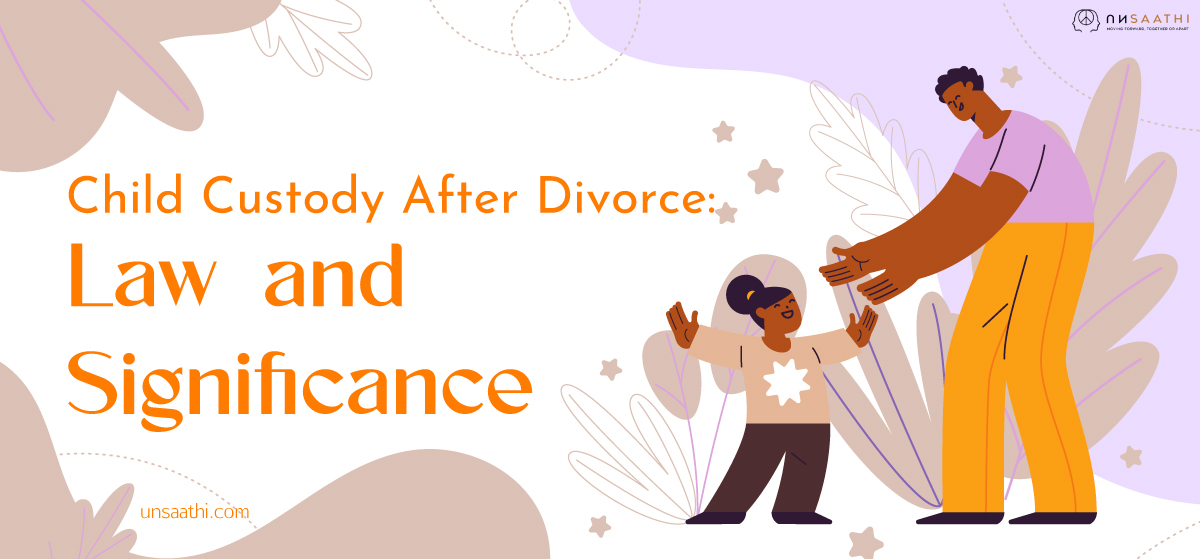Divorce ends a marriage but doesn’t have to mean the end of effective parenting. Yes, the romantic relationship dissolves, but the bond of parent to your children remains, and the maintenance and nurturing of that bond will take place under your roof in a supportive and healthy environment.
Co-parenting, or the act of raising children together while living separately, takes dedication, compromise, and a mutual commitment to your children’s best interests.
Decorrelating from your partner after a divorce can be daunting, but there are several key steps to foster a healthy co-parenting relationship to keep your children happy and help them grow into well-adjusted adults.
In this blog, we will discuss practical tips and strategies for successful co-parenting, with an emphasis on trying to build bridges rather than walls.

Co-Parenting: Legal Provisions and Best Practices
Co-parenting or raising children after divorce/separation is about making sure your children come first. It requires open lines of communication, cooperative decision-making and parenting styles between homes.
Legal terms are typically set out in custody agreements, and they explain visitation schedules, financial responsibilities, and decision-making authority. Courts focus on the child’s best interest, which is meant to motivate parents to cooperate and minimise Conflict. Mediation and co parenting classes help you create effective co parenting plans so that children can retain stable relationships with both parents. These are the key points on how to do co-parenting effectively:
Always put your kids first:
The cornerstone of successful co-parenting is always prioritising your kids’ needs. The overriding principle in all your decisions must be the emotional and physical safety of your children.
Set aside personal animosity:
Your kids shouldn’t be collateral damage from your former relationship. Please don’t make it all about your complaints and focus on their needs so that they can have an emotionally stable future. It is essential to note that co-parenting is not about favouritism.
Providing a Stable Environment:
Keep schedules, rules, and expectations consistent across both households so that kids don’t have to adjust their schedules repeatedly.
Shield Your Kids:
Do not discuss adult issues with your children, and do not disparage your ex-spouse in front of them. Do not use them as messengers or confidants.
Hear their concerns:
Validate their emotions and create an open environment for them to share their worries. Communication is paramount, and talking to your kids effectively will strengthen your bond with them.
Communicate with each other effectively:
The key to being successful co-parents is communication. Here are a few tips to set up established lines of communication(s).
- Pick a neutral communication platform: Use email, a text message, or a co-parenting tool. Do not use your children as go-betweens.
- Maintaining a respectful tone: Regardless of disagreements, if they arise, talk calmly and respectfully. Stick to the issue and avoid personal attacks. It is important to note that not every disagreement needs to be a fight. Revisit the things that really matter.
- Use direct and clear words: Do not be vague, and make sure this makes sense to both parents.
- Establish regular check-ins: Decide on a schedule of regular meetings or phone calls to address any critical issues regarding your children.
- Keep a record of everything: Document every conversation, agreement, and expense.
- Develop a Co-Parenting Plan: Developing a co-parenting plan provides a clear roadmap for handling the complexities of raising children in separate households.
- Get professional help: A mediator or family therapist can help develop an in-depth and practical co-parenting plan.
- Cover the finals: The parents must cover custody, visitation, holidays, vacations, decision-making, and financial responsibilities.
- No vague language: Explain all plan details clearly to your partner. Clarity will not only provide you both with stability but will also contribute to the kid’s well-being.
- Be open to rescheduling: Life happens, and things can change. Adjust the plan as needed with mutual agreement.
- Schedule regular review and revision: As the child ages and their needs change, checking in and updating the plan is essential.
- Keep Consistency Across Houses: Having a routine gives children a sense of security and minimises confusion.
- Create similar routines: Kids need to have the same schedule, i.e., the same bedtimes, meal times, and study schedules in both homes.
- Have similar rules and discipline: Communicate and commit to the same disciplinary strategies and consequences. This will make your kid’s life easy and help them adjust better in both the homes.
- Share information: Make sure you each know of any school events, after-school activities, medical appointments and other important information.
- Coordinate on important choices: Take time to discuss and agree on major decisions about aspects of life such as schooling, health care, and matters of religious upbringing.
- Be Respectful Of Your Parenting Styles: Although you may have differing parenting techniques, respect each other’s styles and don’t undermine each other’s authority.
- Prioritise your kid’s needs: Both parents are working towards the same goal; thus, it is essential to make decisions for their children’s well-being.
- Don’t criticise each other’s parenting: Nobody’s perfect, and being a parent is tricky. Therefore, offering concerns in a constructive and respectful tone is essential.
- Trust each other’s decisions: Unless there is a real and imminent threat to the kids, trust in the other parent’s parenting decision.
- Be flexible: Understand that parenting styles might change over the course of a lifetime. So, it is crucial to understand and adjust accordingly.
- Manage Conflict Effectively: Differences are inevitable, so gleaning them appropriately and handling them is important.
- Listen actively: This means really listening to what your ex-spouse has to say and demonstrating an understanding of their perspective. A mediator can also be helpful if the Conflict cannot be resolved without a third party.
- Do not drag the children into the wars: Do not use your kids as pawns or make them choose sides.
- Prioritise Self-Care: Co-parenting and its emotionally draining aspects. Be cognizant of how you take care of yourself because that is how you keep yourself healthy and keep your kids healthy too. It is essential to spare time for hobbies, workouts, and relaxation.
- Establish limits: Protect your time and energy by establishing distinct borders with your ex-spouse.
- Reach out for help: Open up to friends, family, or a therapist about how you’re feeling and the hurdles you face.
- Prioritise your own recovery: Give yourself the space to mourn the demise of your marriage and heal.
- Master Flexibility and Compromise: Co-parenting is about compromising and not being rigid.
- Be Open To Compromise: You will need to work together as a team to get through the tough times, so be open to negotiating.
Co-Parenting Help: It’s Okay to Ask
Co-parenting is actually tough, so you can always ask for help from others. Do not be afraid to ask for it.
Mental health professionals (therapists and counsellors): Professionals will for sure understand your situation and assist with both parent and child.
Mediators: Hiring a mediator might help resolve conflicts, facilitate communication, and assess situations objectively.
Training for better: Parenting classes can give the couple tools to co-parent successfully. These classes will help the parents better understand their child’s needs.
Remember the Long-Term Goal: You are not automatically a successful co-parent; this is an ongoing process that takes time and effort.
Keep your eye on the prize: YOUR CHILDREN :
Never lose hope of your children: Your children need both of you.
In focusing on your kids’ needs, having direct communication when necessary and collaborating as co-parents, you can set a co-parenting environment that is healthier for your kids and supports their emotional welfare. Keep in mind co-parenting is a process, not a destination. With patience, understanding and a mutual commitment to your children, you can help erect bridges, not walls, and shape a better future for your family.




